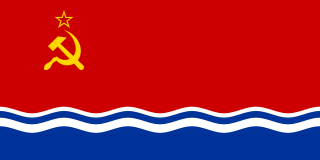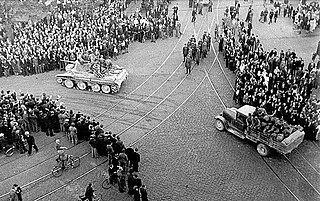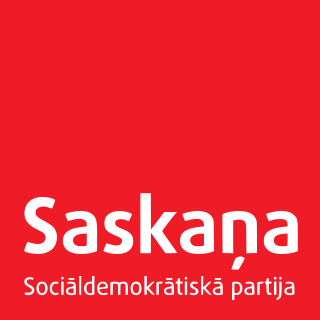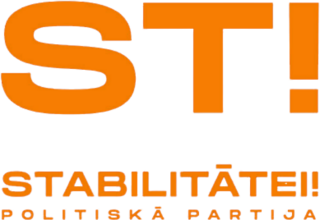 |
|---|
Municipal elections were held across Latvia on 3 June 2017. All 119 municipalities and republican cities of Latvia elected their city councils. In Riga the joint list of the Social Democratic Party "Harmony" and Honor to serve Riga won a majority.
 |
|---|
Municipal elections were held across Latvia on 3 June 2017. All 119 municipalities and republican cities of Latvia elected their city councils. In Riga the joint list of the Social Democratic Party "Harmony" and Honor to serve Riga won a majority.
The following map shows the results of the local elections in different territories of Latvia. The colour, which each territory has, indicates the party, which received the majority of votes in this territory.

 | |||||
|---|---|---|---|---|---|
| Party | Votes | % | Seats | +/– | |
| Social Democratic Party "Harmony"–Honor to serve Riga | 127,099 | 51.02 | 32 | –7 | |
| Latvian Association of Regions–Latvian Development | 34,176 | 13.72 | 9 | +9 | |
| New Conservative Party | 33,553 | 13.47 | 9 | +9 | |
| National Alliance | 23,135 | 9.29 | 6 | –6 | |
| Unity | 15,653 | 6.28 | 4 | –5 | |
| Union of Greens and Farmers | 8,249 | 3.31 | 0 | 0 | |
| Who Owns the State? | 3,824 | 1.53 | 0 | New | |
| For Latvia From the Heart | 1,517 | 0.61 | 0 | New | |
| All-Latvian Social Democratic Movement | 799 | 0.32 | 0 | New | |
| Latvian Social Democratic Workers' Party | 576 | 0.23 | 0 | 0 | |
| Eurosceptic Action Party | 549 | 0.22 | 0 | New | |
| Total | 249,130 | 100.00 | 60 | 0 | |
| Valid votes | 249,130 | 99.61 | |||
| Invalid/blank votes | 977 | 0.39 | |||
| Total votes | 250,107 | 100.00 | |||
| Registered voters/turnout | 426,505 | 58.64 | |||
| Source: Central Election Commission of Latvia | |||||
| Party | Votes | % | Seats | +/– | |
|---|---|---|---|---|---|
| Latgale Party | 7,899 | 28.88 | 6 | +2 | |
| Social Democratic Party "Harmony" | 7,786 | 28.47 | 5 | +1 | |
| Our Party | 5,347 | 19.55 | 4 | +4 | |
| Honour to Serve Latvia | 1,193 | 4.36 | 0 | – | |
| Latvian Russian Union | 1,185 | 4.33 | 0 | – | |
| Alternative | 1,095 | 4.00 | 0 | – | |
| Union of Greens and Farmers | 1,058 | 3.87 | 0 | – | |
| For Latvia From the Heart | 971 | 3.55 | 0 | – | |
| United for Latvia | 295 | 1.08 | 0 | – | |
| Eurosceptic Action Party | 271 | 0.99 | 0 | – | |
| For Latvia's Development | 138 | 0.50 | 0 | – | |
| Christian Democratic Union | 75 | 0.27 | 0 | – | |
| Unity | 35 | 0.13 | 0 | – | |
| Total | 27,348 | 100.00 | 15 | – | |
| Valid votes | 27,348 | 98.91 | |||
| Invalid/blank votes | 302 | 1.09 | |||
| Total votes | 27,650 | 100.00 | |||
| Registered voters/turnout | 58,483 | 47.28 | |||
| Source: Central Election Commission of Latvia | |||||
| Party | Votes | % | Seats | +/– | |
|---|---|---|---|---|---|
| Liepāja Party | 7,279 | 31.61 | 6 | –1 | |
| Latvian Association of Regions | 6,787 | 29.47 | 5 | New | |
| Social Democratic Party "Harmony" | 4,558 | 19.79 | 4 | +1 | |
| National Alliance | 885 | 3.84 | 0 | – | |
| In Liepāja Square | 780 | 3.39 | 0 | – | |
| Justice National Union | 740 | 3.21 | 0 | – | |
| New Conservative Party | 728 | 3.16 | 0 | – | |
| Unity | 607 | 2.64 | 0 | – | |
| Honour to Serve Latvia | 430 | 1.87 | 0 | – | |
| For Latvia From the Heart | 234 | 1.02 | 0 | – | |
| Total | 23,028 | 100.00 | 15 | – | |
| Valid votes | 23,028 | 98.91 | |||
| Invalid/blank votes | 254 | 1.09 | |||
| Total votes | 23,282 | 100.00 | |||
| Registered voters/turnout | 45,856 | 50.77 | |||
| Source: Central Election Commission of Latvia | |||||
| Party | Votes | % | Seats | +/– | |
|---|---|---|---|---|---|
| Union of Greens and Farmers | 7,097 | 41.97 | 7 | +1 | |
| Social Democratic Party "Harmony" | 3,352 | 19.82 | 3 | 0 | |
| National Alliance | 2,023 | 11.96 | 2 | 0 | |
| Unity | 1,546 | 9.14 | 1 | –1 | |
| Latvian Association of Regions | 1,443 | 8.53 | 1 | New | |
| Who Owns the State? | 922 | 5.45 | 1 | New | |
| Honour to Serve Latvia | 368 | 2.18 | 0 | – | |
| Socialist Party of Latvia | 160 | 0.95 | 0 | – | |
| Total | 16,911 | 100.00 | 15 | – | |
| Valid votes | 16,911 | 98.98 | |||
| Invalid/blank votes | 175 | 1.02 | |||
| Total votes | 17,086 | 100.00 | |||
| Registered voters/turnout | 39,447 | 43.31 | |||
| Source: Central Election Commission of Latvia | |||||

Latvia, officially the Republic of Latvia, is a country in the Baltic region of Northern Europe. It is one of the three Baltic states, along with Estonia to the north and Lithuania to the south. It borders Russia to the east and Belarus to the southeast, and shares a maritime border with Sweden to the west. Latvia covers an area of 64,589 km2 (24,938 sq mi), with a population of 1.9 million. The country has a temperate seasonal climate. Its capital and largest city is Riga. Latvians, who are the titular nation and comprise 63.0% of the country's population, belong to the ethnolinguistic group of the Balts and speak Latvian. Russians are the most prominent minority in the country, at almost a quarter of the population; 37.7% of the population speak Russian as their native tongue.

The history of Latvia began around 9000 BC with the end of the last glacial period in northern Europe. Ancient Baltic peoples arrived in the area during the second millennium BC, and four distinct tribal realms in Latvia's territory were identifiable towards the end of the first millennium AD. Latvia's principal river Daugava, was at the head of an important trade route from the Baltic region through Russia into southern Europe and the Middle East that was used by the Vikings and later Nordic and German traders.

The politics of Latvia takes place in a framework of a parliamentary representative democratic republic, whereby the prime minister is the head of government, and of a multi-party system. The President holds a primarily ceremonial role as Head of State. Executive power is exercised by the government. Legislative power is vested in both the government and parliament, the Saeima. The Judiciary is independent of the executive and the legislature. The Economist Intelligence Unit rated Latvia a "flawed democracy" in 2022.

Riga is the capital, the primate, and the largest city of Latvia. Home to 605,273 inhabitants, the city accounts for a third of Latvia's total population. The population of Riga metropolitan area, which stretches beyond the city limits, is estimated at 860,142. The city lies on the Gulf of Riga at the mouth of the Daugava river where it meets the Baltic Sea. Riga's territory covers 307.17 km2 (118.60 sq mi) and lies 1–10 m (3–33 ft) above sea level on a flat and sandy plain.

Baltic Germans are ethnic German inhabitants of the eastern shores of the Baltic Sea, in what today are Estonia and Latvia. Since their resettlement in 1945 after the end of World War II, Baltic Germans have markedly declined as a geographically determined ethnic group in the region.

The Latvian Soviet Socialist Republic was De facto one of the constituent republics of the Soviet Union between 1940–1941 and 1944–1990.

The Latvian Social Democratic Workers' Party is a social-democratic political party in Latvia and the second oldest existing Latvian political party after the Latvian Farmers' Union. It is currently represented with two seats in the parliament of Latvia as a part of the Union of Greens and Farmers alliance after an absence of 20 years. The party tends to hold a less Russophilic view than fellow social-democratic party "Harmony".

The Latvian Russian Union (LKS) is a political party in Latvia supported mainly by ethnic Russians and other Russian-speaking minorities. The co-chairpersons of the Latvian Russian Union were Miroslavs Mitrofanovs and an alleged Russian agent Tatjana Ždanoka.

Russians in the Baltic states is a broadly defined subgroup of the Russian diaspora who self-identify as ethnic Russians, or are citizens of Russia, and live in one of the three independent countries — Estonia, Latvia, and Lithuania — primarily the consequences of the USSR's forced population transfers during occupation. As of 2023, there were approximately 887,000 ethnic Russians in the three countries, the year of the last census during the 1944–1991 Soviet occupation of the three Baltic countries.

Riga City Council is the government of the city of Riga, the capital of Latvia. Its meeting place is in the Riga Town Hall at the Town Hall Square (Rātslaukums) in the very heart of Riga.
In Latvia, Russians have been the largest ethnic minority in the country for the last two centuries. The number of Russians in Latvia more than quadrupled during the Soviet occupation of Latvia when the size of the community grew from 8.8% of the total population in 1935 (206,499) to 34.0% in 1989 (905,515). It started to decrease in size again after Latvia regained independence in 1991 falling to 23.4% at the beginning of 2024.

The Latvian Socialist Soviet Republic was a short-lived socialist republic formed during the Latvian War of Independence. It was proclaimed on 17 December 1918 with the political, economic, and military backing of Vladimir Lenin and his Bolshevik government in the Russian SFSR. The head of government was Pēteris Stučka with Jūlijs Daniševskis as his deputy.

The Soviet occupation of Latvia in 1940 refers to the military occupation of the Republic of Latvia by the Soviet Union under the provisions of the 1939 Molotov–Ribbentrop Pact with Nazi Germany and its Secret Additional Protocol signed in August 1939. The occupation took place according to the European Court of Human Rights, the Government of Latvia, the United States Department of State, and the European Union. In 1989, the USSR also condemned the 1939 secret protocol between Nazi Germany and herself that had led to the invasion and occupation of the three Baltic countries, including Latvia.

Ainārs Šlesers is a Latvian business oligarch and politician who was Deputy Prime Minister of Latvia, as well as Deputy Mayor of Riga. Currently he is a member of the Latvian Parliament with his political party, Latvia First, holding 9 seats in the parliament.

The Social Democratic Party "Harmony", also commonly referred to as Harmony (Saskaņa), is a social-democratic political party in Latvia. It was the largest political party in the Saeima, representing the Russian minority of Latvia, before losing all of its parliamentary seats in the 2022 Latvian parliamentary election. It is currently led by Jānis Urbanovičs.

Honor to serve Riga! is a municipal political party located in Riga, Latvia. It was created on 17 March 2012 and is led by Andris Ameriks, the former deputy mayor of Riga.

The Progressives is a social-democratic and green political party in Latvia. The party was founded on 25 February 2017. Since 4 September 2021 its leaders have been Antoņina Ņenaševa and Atis Švinka. The Progressives have 11 seats on Riga City Council and 10 seats in the Saeima and one seat in the European Parliament.

The Livonia electoral district was a constituency created for the 1917 Russian Constituent Assembly election. The electoral district covered the Livonia Governorate, as well as the parts of the Courland Governorate not under German occupation.

The 2020 Riga City Council election was held from 26 to 29 August 2020 to elect the 60 members of Riga City Council. The election was initially scheduled for 25 April 2020, and then rescheduled three times – once due to a court ruling and twice due to the COVID-19 pandemic in Latvia, to 2 May, 6 June, and 29 August. The council will be elected for nearly five years instead of the standard four, and the next election is scheduled to take place in 2025, at the same time as all other municipal elections in Latvia.

For Stability! is a Eurosceptic Latvian political party founded on 26 February 2021. It was founded by former members of the Riga City Council Aleksejs Rosļikovs and Valērijs Petrovs. It is a party that advocates Russian minority politics, and it describes itself as centrist on the political spectrum.